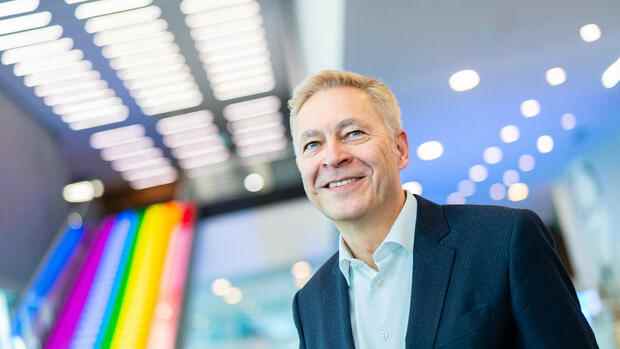In July, the Steag supervisory board announced that it had unanimously extended Reichel’s appointment as CEO.
(Photo: Funke Photo Services)
Dusseldorf Andreas Reichel is standing in front of a large construction site: the boss of Germany’s fifth largest energy company Steag has to steer his company through a sales process. The previous owner of the group, the municipal investment company KSBG, wants to withdraw in the future.
The Stadtwerke Dortmund, Duisburg, Bochum, Essen, Oberhausen and Dinslaken behind KSBG want to sell Steag by 2023 at the latest, that was already decided.
The environment now appears particularly favorable for speedy sales. Electricity prices are extraordinarily high, and in order to save gas in winter, coal-fired power plants in Germany are increasingly being used to generate electricity again instead of gas-fired power plants.
This situation should help Reichel and the Steag owners to find buyers for the “black” part of the Steag business – i.e. the coal-fired power plants. According to Steag, the coal-fired power plant business is to be sold together with the company’s green energy production division. This process is now starting earlier than planned, as the Handelsblatt reported exclusively.
Top jobs of the day
Find the best jobs now and
be notified by email.
For Reichel, the exceptional energy policy situation brings hope that he can enable the municipal owners of his company to exit without loss. He told the Handelsblatt: “Our shareholders have declared that they want to end their involvement with Steag by the end of 2023. It is now our task as Steag management to enable our shareholders to sell their Steag shares on reasonable terms.” At the end of 2021, Steag had net debt of 485 million euros and 1.23 billion euros in pension provisions.
>> Read here: EnBW boss Mastiaux raises the alarm: “We have to save energy wherever possible”
The Steag boss is at the center of the planned, saving change of ownership. The 61-year-old lawyer, who was a member of the FDP in the NRW state parliament from 1985 to 1995, then gained 17 years of experience in management positions in the energy industry.
Initially he headed corporate communications at the Ruhrgas company, then as a board member at Eon Edis AG he was responsible for human resources and law, as well as renewable and decentralized energies, among other things.
Reichel has been Managing Director at Steag since August 2020. At the beginning of this year he took over the chairmanship of the Steag management board after his predecessor Joachim Rumstadt resigned. Since then it has been clear that Reichel will be able to use his experience with renewable energies and that his tenure will be marked by a fundamental transformation of the company.
So far, people seem satisfied with his work: In July, the Steag supervisory board announced that it had unanimously extended Reichel’s appointment as CEO.
Further electricity production from hard coal
The planned change is now likely to be a little different than planned. Originally, Steag in Germany only wanted to have its modern Duisburg-Walsum 10 coal-fired power plant connected to the grid in view of the energy transition from November 2022 and was considering converting the plant to CO2-neutral wood pellets. Power plants in Bergkamen and Völklingen-Fenne were to be shut down.
But while gas was still considered an important bridging technology on the way to a climate-neutral energy supply in Germany at the beginning of the year, the federal government now wants to save as much gas as possible because of the severely restricted gas supplies from Russia. Hard coal reserve power plants are therefore allowed to produce electricity again.
Accordingly, in November 2022, instead of just one hard coal-fired power plant, several Steag plants should be producing electricity from fossil raw materials. “Steag is ready to take up to five hard coal-fired power plant blocks from the reserve in accordance with the provisions of the Replacement Power Plant Provision Act and to continue to operate them for a certain period of time on its own responsibility,” Reichel told the Handelsblatt.
Difficult transition process for the workforce
According to Reichel, the electricity and heat that Steag can also generate will be needed in the next two winters. But the company wants to move away from coal in the long term.
However, potential investors may still be hoping to make enough profit with the income until the coal activities are finally shut down so that the purchase of the Steag activities is worthwhile.
As good as the sales environment currently looks, the cultural process that Steag boss Reichel and his staff are likely to face is difficult. Steag explained to the Handelsblatt that the company should be sold “as a whole” and “not in parts”.
However, it is also clear that under the Steag umbrella two subgroups are to be created that are separate in terms of organization, personnel and company law. Existing departments are likely to be separated, and the day-to-day work of many employees is likely to change.
Last but not least, the uncertainty about the future also affects Reichel himself. What a new, not yet fixed owner will decide in terms of management is at least not clear.
More: The first reserve hard coal power plant goes into operation

